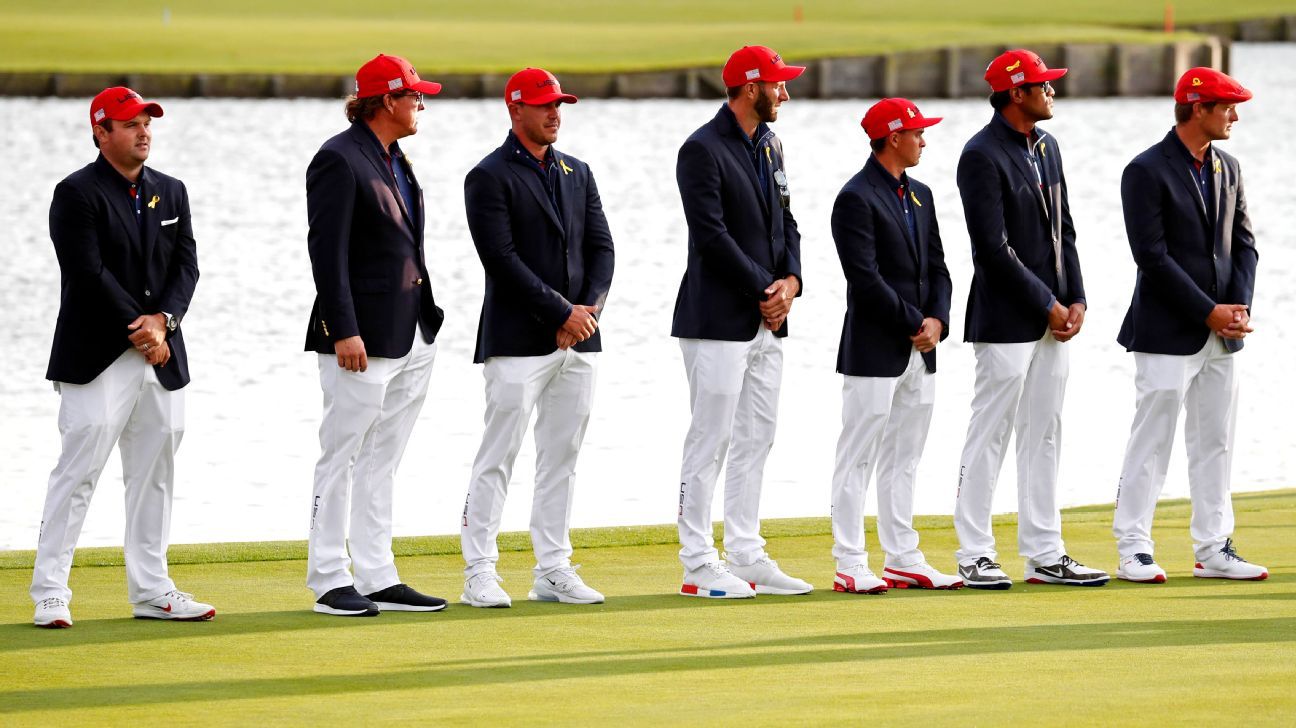The decision has loomed for weeks, and the PGA of America will make it official Wednesday when it postpones the Ryder Cup for a year due to the coronavirus pandemic.
A source who was not authorized to speak publicly on the matter told ESPN on Tuesday that the event, scheduled for Sept. 25-27 at Whistling Straits in Wisconsin, will be delayed until the same timeframe in 2021.
“There will not be a Ryder Cup this year,” the source said. “The Ryder Cup will go to 2021, the Presidents Cup to 2022 and then they will alternate from there.”
The PGA of America and European Tour are expected to release the information officially on Wednesday morning.
British newspapers the Telegraph and the Guardian reported weeks ago that the Ryder Cup would be postponed, but getting to this point required the cooperation of numerous entities, including the PGA Tour and the European Tour.
The Presidents Cup was scheduled for Sept. 30-Oct. 3, 2021, at Quail Hollow in Charlotte, North Carolina. The Ryder Cup will now take that window, with the Presidents Cup moving to 2022 and the next Ryder Cup, scheduled for Sept. 30-Oct. 2, 2022, in Rome also pushed back a year.
“There’s a lot of behind-the-scenes things that people don’t know,” the source said. “They have to look out for the best of each organization. I think there is way more to it than people would realize.”
The biennial competition between the United States and Europe was like all other sports events during this time, grappling with the idea of playing with limited spectators or none at all, or postponing or canceling the three-day event at Whistling Straits.
Given the uncertainly of the situation less than three months out from the scheduled event, PGA of America officials decided to postpone to next year after negotiating with the PGA Tour to move the Presidents Cup.
The idea of a spectator-less Ryder Cup had been particularly unappealing to many of those who would take part in it.
U.S. captain Steve Stricker and European captain Padraig Harrington both expressed disappointment over the possibility, although Harrington had come around to the idea of “taking one for the team” in order for the European Tour to reap the financial rewards of a televised competition.
But many players did not like the idea of proceeding with a closed Ryder Cup, particularly Rory McIlroy.
“The players are the ones that make the Ryder Cup,” the European star said in May. “If they are not on board with it and don’t want to play, then there is no Ryder Cup. I see it being pushed back until 2021, and, honestly, I think that will be the right call.”
But it was not an easy call. First, there was the matter of forgoing significant television rights fees this year, spectators or not. The PGA of America is already scheduled to play the PGA Championship, Aug. 6-9, without fans, a huge financial hit to the organization of 28,000 club professionals.
Then there was the issue of moving a European Ryder Cup, scheduled for Italy in 2022, back a year. The European Tour relies significantly on home Ryder Cups profits to operate on an annual basis.
Not to be forgotten is the PGA Tour. Although the tour has no stake in the Ryder Cup, its players are participants. And after taking a huge financial hit in 2020 and losing millions of dollars due to a 13-week break from tournament golf, the idea of forgoing a lucrative Presidents Cup could not have been pleasant. It is unclear whether a financial arrangement between the PGA of America and PGA Tour was reached.
PGA Tour commissioner Jay Monahan spearheaded the effort to get all of the various golf bodies together back in April to map out a schedule, allowing the major championships to pick their dates, with the PGA Tour then working its schedule around them. For example, the Aug. 6-9 PGA Championship dates had originally been held by the Wyndham Championship; the tour subsequently moved it and the three FedEx Cup playoff events a week later on its revised schedule.
The PGA Tour events were also scheduled for the weeks of the U.S. Open (Sept. 17-20) and the Masters (Nov. 12-15).
Part of the long process to get to this point was to re-work various contracts that the PGA of America, PGA Tour and European Tour had with vendors, hotels and myriad other entities involved in putting on big sporting events.
The Ryder Cup, which began in 1927 and is played every other year, was not played from 1939 through 1945 — a period of four Cups — due to World War II. It was postponed one other time, in 2001, in the aftermath of the Sept. 11 terrorist attacks. The tournament was pushed back a year, and the Presidents Cup followed.
“I want a Ryder Cup with full capacity,” England’s Paul Casey said last month as this decision loomed. “I want it with screaming fans. I saw the headlines. .. I fully support that. Even as a European, knowing how loud that would be for the American team, that’s what I want. We want to play a Ryder Cup in that environment, in that cauldron, and [postponing] is the right thing to do.”
